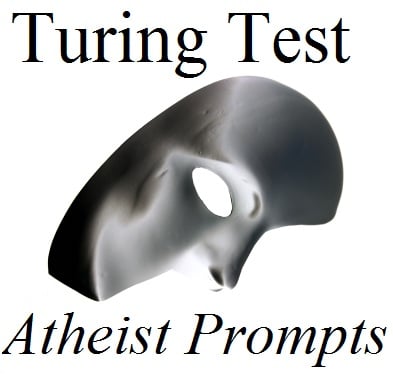This is the third entry in the Atheist round of the 2013 Ideological Turing Test. This year, atheists and Christians responded to questions about sex, death, and literature.
Polyamory
There is no good reason to oppose polygamy. None whatsoever. Most media coverage of polygamy these days concerns sensational cases with arranged marriage, patriarchy, misogyny, incest, and paedophilia, but that does not mean that polygamy necessarily entails any of those crimes and abuses. The polygamy you need to go out of your way to find, the polygamy that is practised by more-than-couples who are living together as if they had the plural marriage they cannot legally gain, is often surprisingly egalitarian. Women appear to take multiple husbands just as often as men take multiple wives. Children have more role models to follow and all family members receive ample support. The informal communities that grow around this lifestyle value consent, honesty, and accountability. Of course this is anecdotal information gleaned from those few secular polygamists who reveal their lives to journalists. There is little information to go on. And that is just the point: we have insufficient and inconsistent data. Until we have evidence that secular legal polygamy results in sexism or paedophilia, people must be legally free to choose to polygamy. (See my defence of autonomy in the euthanasia section, which does double duty as the moral-political foundation of both arguments.)
The section title asks us to discuss polyamory, which extends much further than polygamy. Polyamory is having romantic relationships with multiple people simultaneously. This is not only morally acceptable but also quite common. Many people casually date multiple people at a time. Moreover, there isn’t always a clear divide between polyamory and monoamory. Even if romantic relationships are discrete and countable and you have no more than one of them, your emotional situation may not be so clear. Is flirting with multiple people monoamory? Is dating when you still have feelings for your ex-partner monoamory? There is no clear demarcation. It is unfair to expect people to have romantic feelings for only one person at a time. It is fairly common for people to love and be in love with two or more people, and such feelings cannot be unethical because they are not chosen. Of course many people do not want to share a romantic partner, and that’s fine too. What is important is emotional honesty, autonomy, and informed consent. Conforming to arbitrary and inherited norms about what a romantic relationship should look like is not important. As a friend of mine says, not understanding another person’s feelings does not give you a license to condemn those feelings. I would add that it makes your condemnation even less justifiable because you cannot condemn what you do not understand. Isn’t that the idea behind this Turing Test?
Euthanasia
I want to get a common argument against euthanasia out of the way immediately. Very few people who oppose euthanasia actually support policies which recognize the supposed “sanctity of all life” on which they base their opposition to euthanasia. If someone truly believed that all life was sacred, they would be a vegan. If someone truly believed that all human life was sacred and that taking a human life could only be acceptable in extraordinary circumstances, they would much more frequently oppose military and police use of deadly force, and they would support radical environmental, anti-poverty, and universal health care policies. Thus we can reject that argument. Life is not intrinsically sacred and almost no one thinks so in an actionable way, especially not the social conservatives who usually oppose euthanasia.
What we must defend before life is autonomy. Obviously there must be limits to autonomy: we cannot use our autonomy to act in ways that unreasonably limit another person’s autonomy. We can say this because autonomy isn’t an intrinsic right. There are no such things as rights; what we call rights are necessary politico-legal fictions. We must fight for maximum autonomy, even when it allows us to do things which might harm us in the long run, because if we allow political power to curb our autonomy we would become vulnerable to politicians or factions which would impose a perverse morality upon us, which would be much more likely to inflict much more serious harm on more of us than would result from our own indiscretions. However, if we fight for maximum autonomy we must not do so in the way of libertarians. A laissez-faire state is not free because economic and educational inequalities would result in radically limited autonomy for many people. Good legal policies—for instance, taxation or gun restrictions–might appear to limit autonomy at first, but if successful they would promote an equal distribution of maximum autonomy across the system. So in order to oppose euthanasia, we must have evidence to suggest that a person choosing euthanasia would significantly limit other people’s autonomy. As far as I can tell, we have no such evidence. Therefore, we cannot oppose euthanasia.
However, all I have so far argued is that euthanasia must be legally allowed. The implied question is whether euthanasia is morally permissible. That sort of thing would need to be decided case by case. I doubt, however, that a person in extraordinary pain which will never be alleviated could be doing more harm to others by dying than they would do to themselves by living, so I predict that euthanasia is often morally permissible, maybe an active good.
And what of euthanizing someone incapable of consent because they are a minor, incapable of communication, or incapable of conscious thought? If I am arguing for euthanasia on the grounds of autonomy, could I support euthanasia when the patient’s family or guardian has chosen it for them? By my reasoning euthanasia is permissible in these situations if either 1. the patient’s known wishes are consulted as much as possible or 2. the patient is incapable of exercising any agency and will likely remain this way, on the grounds that under 1. autonomy is still being upheld as much as possible and under 2. autonomy is no longer at issue.
Bonus
Card’s idea factor would probably be most important to me. However, my answer for the best genre is the near-future dystopian novel, which would suggest that the milieu factor might be important, too. Since my ethics are concerned primarily with the maximization of autonomy and the minimization of harm, I would need a political dimension to my novel. Since I am also interested in the conflict between political decentralization, which I consider desirable, and the need for strong government to override popular prejudices, such as the legal and political machinery around Prop 8, a dystopian world with a strong government and violent extremists would be a good place to explore ideas that interest me and shape my concerns. This means that milieu would be necessary to explore the ideas. You could say that the idea factor would arise in the conflict between the characters and the milieu. I might be cheating in this answer, though. I suspect that most people could use a dystopian novel to illustrate their political opinions. The difference might be that, while some people would focus more on social dissolution or anarchy, I would focus on oppression.
You can vote on whether you think these answers were written by a Christian or an Atheist here. Comments are open to discuss the substance of the post and for speculation about the true beliefs of the author, so please vote before looking at the comments.
















